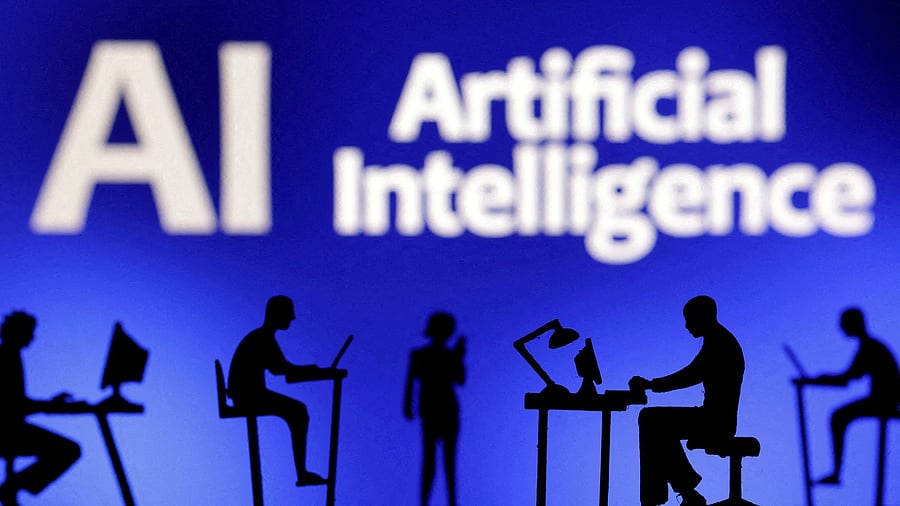
Figurines with computers and smartphones are seen in front of the words "Artificial Intelligence AI" in this illustration
Credit: Reuters Photos
France and India are co-chairing a two-day Summit on the Artificial Intelligence (AI) in Paris from February 10. AI is playing a notable role in the advance and spread of the fourth industrial revolution which will power human progress in industry, agriculture, consumer goods, medicine, warfare, space and other fields in the coming decades.
So far, the United States with its ChatGPT and China with its DeepSeek models for research and information have dominated the headlines. But many countries think that they should also be in the forefront of AI research, developing new foundational models and their applications, and not be left out from availing its advantages. AI is revolutionising financial services, e-commerce, manufacturing, entertainment, healthcare, and warfare.
The militaries in the US, China, and other countries are using AI for optimal resource allocation for various theatres of conflict. AI helped the US’ intelligence community to predict Russia’s invasion of Ukraine. It is now working on a model which would incorporate all the available writings and speeches of Chinese leaders, and its own intelligence inputs to work out how Chinese President Xi Jinping would execute a particular policy.
Like any other tool, the AI can also be used negatively by certain State and non-State actors to synthesize deadly chemical and biological weapons, and the use of genomes of humans and other animals to alter their behaviour for destructive purposes.
The Paris conference will seek an inclusive, effective, and open access of AI to all nations in a safe, reliable, and environmentally friendly manner, push for defining policies and guidelines, and setting up a collective scientific foundation. Five focus areas are: the use of AI in public service, employment, building trust and reliability of AI systems, effective and inclusive global governance, and showcasing intersection of AI and culture.
France wants to set up an open AI Foundation with a funding of 500 million euros this year and 2.5 billion euros over time equally from the public and private sources. The conference will be attended by Prime Minister Narendra Modi, US Vice-President J D Vance, heads of state and government, heads of top AI companies, academics, research, NGOs, and artistes.
With its large data base of Internet users, work force of IT professionals, and an impressive digital public infrastructure, India has the necessary perquisites to develop as a major AI power. According to Ashwini Vaishnaw, the Union Minister of Communications, Electronics and IT, India is building foundational AI models using 18,000-plus high-end GPUs and several start-ups have begun work on this following the government’s call for proposals.
The US has emerged as an AI leader with China trailing close behind. It is believed that the US is currently five years ahead of China in manufacturing the fastest chips H100s, H200s, and the new Blackwell chips; and it is retaining this lead by denying China access to the latest chips and manufacturing technology. China has used previously available chips or those obtained clandestinely or manufacturing its own to build high performance generative AI models at a low cost.
The Paris conference will focus the attention of government, industry, and academic leaders to the rapid advances being made by this cutting edge technology, the need for nations to collaborate for common good of mankind, and for the governments and the businesses to earmark sufficient funds for AI research. Given the massive progress made by China and other countries in the AI, India must use the whole-of-nation approach to catch up to China and others in AI applications in various civilian and military domains. India must use the Paris Conference to ensure that the guidelines for the AI use approved by the conference are in tandem with its strategic interests and it is able to create an ecosystem of AI research and applications including the leading governments, AI companies, and institutions in the world.
(Yogesh Gupta is former secretary, Ministry of External Affairs, New Delhi.)
Disclaimer: The views expressed above are the author's own. They do not necessarily reflect the views of DH.